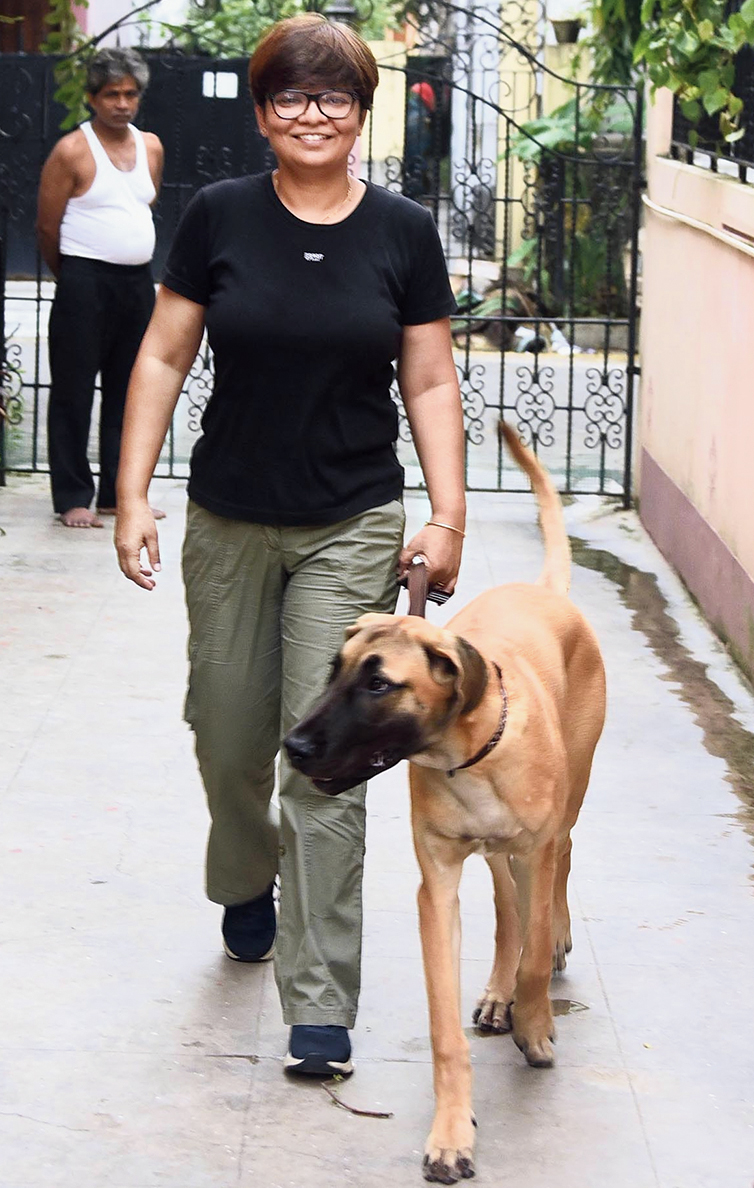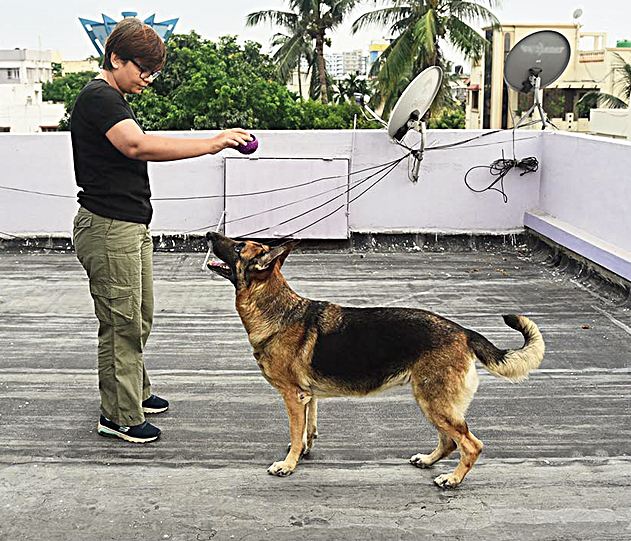A Lhasa Apso who won’t stop barking? A friendly Labrador who’s suddenly turned into a biter? Such stories may send dog owners to a tizzy, but it’s all in a day’s work for Paramita Das. The FE Block resident is a canine trainer and behaviourist who tries to decipher her canine clients’ actions and provide solutions to their owners.
The Telegraph Salt Lake takes a peek into Paramita’s world.
Q How did you get into this field?
I was into human resources for 20 years before I decided, in 2014, to pursue my passion for dogs. I always loved them but that wasn’t enough. I wanted to understand them. So I took, and still take, courses with pioneers in canine behaviour counselling, like Mumbai-based Sherin Merchant and UK-based John Rogerson.
Q And what is your take on the subject now? Do most dog owners not understand their dogs?
Well, problems with dogs are never due to lack of love; they’re due to a lack of understanding. Dogs are always sending us non-verbal signals, if only we can read them.
We have all seen “cute” videos of dogs and toddlers, where the kid climbs up the dog, pulls his ears and tail. But study the dog’s behaviour and you see how annoyed he really is (see box). Keep in mind that most dogs don’t like being hugged. Similarly, a dog baring his teeth doesn’t always not mean he’s aggressive. Look at the rest of his body language — if his ears are turned back and tail tucked under he’s not ferocious but scared!
When a dog brings a ball to his owner, most owners try to wrest it out of his mouth believing that’s the game. This makes the dog possessive. They should let the dog drop the ball on their lap; then pick it up and throw for him to fetch. This way you teach the dog to share.
Q What are the common problems dog owners come to you with?
Fear issues, separation anxiety, aggression, attention-seeking problems, toilet-training problems... Some are fussy eaters; others will only eat if force-fed. This is something dog owners must avoid. The first sign of illness is when the dog stops eating but if you force feed him, how will you know he’s unwell?
Q When is the right time to start training?
A dog’s first trainer is his mother so no matter what the breeder says, never take a puppy away from his mother and litter mates before 60 days.
Preliminary socialisation happens there and the mother teaches the pup lessons like not nipping and toilet training. More than a place, dogs are particular about relieving themselves on a different surface. Also check the mother’s (and if possible, the father’s) nature before picking a pup. Most behavioural problems are correctable but not the genetic ones. In those cases, we can only detect the triggers and try to avoid them.
Q And when we bring the puppy home?
Once the puppy comes home, he will do as you train him to do or allow him to do. Between the age of 60 days and six months, you must expose him to sights, sounds and smells that he will encounter later in life.
It is very important that right from the start the pup allows you to touch his paws, ears, eyes and mouth. You will need access to these later to apply medicines. Also get him used to staying home alone for up to five or six hours. Exercise him beforehand so he’s tired and sleepy and leave him water and food. But when you return, make sure you spend lots of quality time with him. This means more to him than being accompanied by someone the whole day without any interaction with him.

Paramita walks Googly, the Great Dane from FE Block. (Shubham Paul)
Q Are certain breeds prone to be ferocious?
A lot depends on the upbringing but owners must read up on the breeds and learn what the dogs were bred for in the first place. One of the biggest mistakes people make is with the Beagle. They bring home a Beagle puppy thinking it won’t require much activity as it’s small but they don’t realise that these are scent hounds, bred to hunt by scent. Without scent-tracking games, they’ll get bored and destructive.
Similarly, Labradors and Golden Retrievers need fetching games and can be groomed to fetch socks, newspapers etc; German Shepherd Dogs should never be egged on to play chasing games. Originally bred to rear sheep, their tendency would be to round others up and bite them behind the ankles.
Lhasa Apsos were bred to guard Tibetan monasteries so they need special training to not bark at every guest in the house. Guests should be warned not to stroke Rottweilers in the neck as they are sensitive there. Exploiting this feature back in the day, village folk crossing forests would tie their money to the necks of Rottweilers so bandits would get their hands ripped off before reaching there.
Q Many dog owners train their dogs themselves. Is that advisable?
Well, some cases may be unique. Just focus on building a strong relationship with your dog. Use rewards — treats, toys, but most of all, praise. Your affection is what your dog seeks most. Say “good girl!” with your happiest, most excited and stress-free voice. And the praise must come in half a second of the good behaviour. Make the training fun so the dog looks forward to it.
Q How to reprimand a naughty dog?
Never intimidate, smack or yell at him. Say “bad girl” but remember that it’s — not your volume but — your tone that she’ll register. Saying “bad girl” in a sing-song tone will have no effect. Say it in a firm tone with your body stiff and face serious. Dogs recognise facial expressions.
But what’s most important is that the reprimand comes in half a second of the unacceptable behaviour. If he tore the cushions when you were out, you cannot discipline him after returning home after an hour. He just won’t make the connection.
Some people claim their dogs cower and look guilty when scolded. But if you’re scolding him hours after he managed the mischief, he has no idea what you’re scolding him for. He’s cowering as he just wants you to stop it.
Q If a dog hasn’t been trained from birth, is it too late to train him later on?
A dog can learn at any age, as long as his mental faculty is fine. Owners must make sure they don’t lunge at people who don’t like it, don’t beg for food from guests.... They must also scoop the dog’s poop from the road so as to not pollute. And with the right training, our pets would make good canine citizens.
saltlake@abpmail.com











